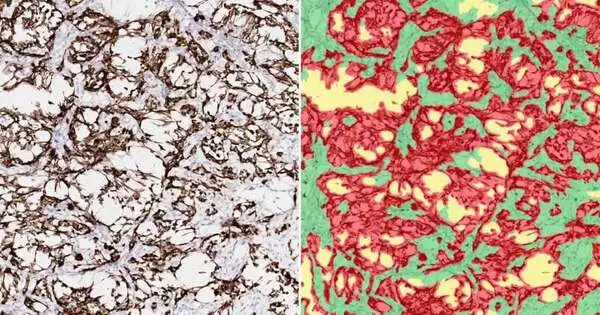One of the most recent and potent cancer treatments is immunotherapy. It causes the body’s immune system to attack tumors because it sees them as intruders. However, not all patients benefit from immunotherapy. Why? Scientists never know for sure.
Steroids known as glucocorticoids (GCs) can treat side effects that immunotherapy patients occasionally experience. In conditions like asthma, Crohn’s disease, and even COVID-19, GCs are frequently used to control the immune response. However, their operation is also a mystery.
Researchers at Cold Spring Harbor Laboratory (CSHL) may now be closer to addressing both concerns. By stimulating the production of a protein known as Cystatin C (CyC), their new research suggests that GCs may indirectly contribute to the failure of some immunotherapy treatments. This kind of therapy is associated with worse outcomes when CyC levels are higher. The research was published in the journal Cell Genomics.
“GCs are very powerful immune suppressors and are thus used to treat autoimmunity, which occurs when the immune system assaults healthy cells.We previously demonstrated that GCs can disrupt cancer therapies. Here’s a possible hint as to how they’re doing it.”
Assistant Professor Tobias Janowitz
“GCs are very powerful suppressors of immunity and are consequently used to treat autoimmunity,” which is when the immune system attacks healthy cells, according to CSHL Assistant Professor Tobias Janowitz. We have previously demonstrated that GCs can disrupt cancer immunotherapy as well. Now, here might be an indication of how they’re doing it:
The entire body’s response to cancer is studied in Janowitz’s lab. He and a doctor-turned-researcher in his lab, Sam Kleeman, collaborated on this study with Assistant Professor Hannah Meyer, a third CSHL scientist who is an expert in quantitative biology. They worked together to look at a huge genetic dataset from the UK Biobank. How big is it? Nearly 500 thousand volunteers, including cancer patients, In order to acquire even more patient data, Kleeman also contacted researchers in other countries.
Patients who were more likely to produce CyC in response to GCs had a lower overall survival rate, according to the researchers. Additionally, these patients were less likely to benefit from treatment. This suggests that a tumor’s production of CyC may be a factor in the failure of cancer immunotherapy.
The researchers used conventional laboratory procedures to confirm the link between CyC and cancer. A CyC-producing gene was deleted in mice to eliminate its presence in cancer cells. They discovered that tumors lacking CyC grew more slowly.
According to Meyer, “It’s really powerful to come at this from multiple angles and support the findings through multiple approaches.” We were able to design some experiments that would assist us in answering the question of what this molecule does thanks to clever genetic models.
According to Janowitz, he intends to continue his research on CyC in the hope that this will be of great benefit to future patients.
He claims, “The research has given me an impetus to learn more about the function of this molecule, particularly in the context of cancer immunotherapy.” To improve the effectiveness of cancer immunotherapy, it might be possible to target its function.”
More information: Tobias Janowitz, Cystatin C is glucocorticoid-responsive, directs recruitment of Trem2+ macrophages and predicts failure of cancer immunotherapy, Cell Genomics (2023). DOI: 10.1016/j.xgen.2023.100347. www.cell.com/cell-genomics/ful … 2666-979X(23)00122-2





